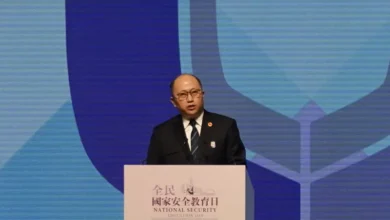The Zimbabwean singer who found fame in China – and obscurity at home

It was 2017 and Jo Stak – wearing a red tuxedo jacket, a bow tie and a homburg hat – was belting out a Mandarin song.
Red and yellow lights shimmered around him as a crowd of cheering, flag-waving fans on the Chinese version of The Voice gave a standing ovation at the end of his act.
Some ‘big deal’
Today, in the Zimbabwean capital of Harare, Joe Takawira – Stak’s real name – is an inconspicuous figure walking down a street in Budiriro 5, the working class suburb where he was born and raised. In 2019, after seven years in China, his work visa expired, and he returned home.Sporting his signature beard, grey sweatpants, sneakers and a black T-shirt, he lights a cigarette.
He saunters past street vendors selling fresh produce and condiments, stops at a corner to chat with a friend, then goes about his day. Whenever he runs into someone he knows, he greets them with a fist bump and a toothy grin.When he’s at home, Stak listens to instrumental music and writes songs in Mandarin.
“This is how I spend my time in Budiriro,” he says, shrugging.
It feels a long way from China and the career he enjoyed there. He has not found the same acclaim back home.
Even his neighbours had no idea about his previous life.
Clemence Kadzomba, who runs a tyre shop in Stak’s neighbourhood, had no idea who his neighbour was until some of his clients who were among the 20,000 Zimbabweans living in China recognised him.
“I couldn’t believe it,” 43-year-old Kadzomba says, grinning.
“They were so excited to see him, like he was some big deal. And yet, here he was, just hanging out with us like it was nothing.”Unexpected journey to stardom
Stak’s musical journey has its roots in the Methodist church-run school he attended as a teenager.
He sang in his church choir, something he loved, and was part of a group of students who recorded a gospel album.
The album did well, and some of the songs have close to a million views on YouTube.
Music runs in his family, says Stak, the middle of three brothers. His older brother wrote songs at school while the youngest brother plays the piano.After graduating, Stak enrolled to study Mandarin in China in 2012, motivated by his love for Chinese culture, which began as a boy watching Jackie Chan’s action films. He was 20 years old when he moved to Shanghai.
This came at a time when Zimbabwe was pivoting away from the West with the late leader Robert Mugabe’s “Look East” policy, adopted in response to United States and European Union sanctions after a 2002 presidential election marred by violence.
Mugabe opened Zimbabwe’s doors to Asia, leading to an influx of Chinese investment as more Zimbabweans headed to China to work or study.
By 2014, Stak was proficient in Mandarin and started posting videos of himself singing in Mandarin to Douyin. “I wanted to explore music in a different language,” he explains as he lights a cigarette and sits back in his chair on the red-floored veranda of his house.
He would sing R&B, hip-hop and pop songs in Mandarin and English and started to get booked for gigs.
“My first gig was at Yuyingtang, a music bar in Shanghai,” he recalls. He says the venue wasn’t very big but he made $1,500 – enough to pay for his food and accommodation for months.
That gig made him realise he could make money from his talent, and it marked the start of his career as a professional pop singer in China.
After that, he played at music bars, festivals, weddings and nightclubs – performing mostly in Mandarin.
Of the 37 songs he recorded, one was in the top 10 on the Chinese music streaming service Baidu Music. “It meant a lot to me,” Stak says excitedly, although it earned him only 5,000 yuan ($865).Then in 2017, he joined the Foundation Band, a group of musicians from Africa, the US and Europe that performed Chinese and Western pop music and hip-hop at weddings and nightclubs.
As the lead vocalist, he caught the attention of Chinese television networks, leading to performances on major stations.
“I was surprised by my success in China,” Stak admits.
Life there was good. His daily routine consisted mainly of “eating, singing and drinking”.
His favourite dish was hotpot – a meal for which diners cook raw ingredients like seafood and tofu in a shared pot of broth at the table.
“Even now, when I miss it, I go to Chinese restaurants,” he says.
He’d perform at night, and during the day, he’d roam along Shanghai’s historic waterfront with its colonial-era architecture and rooftop bars.
Stak made good money. “They pay artists well – I mean 1,000 US dollars minimum for a 10-minute show.”
But he also felt accepted and at home in China, where he says the music industry welcomes foreign talent and invests in it.
Unlike many foreign artists singing in English who can struggle to break into the Chinese market, Stak had an edge – he was an African singing in Mandarin, and there were few performers like him. His ability to perform popular Chinese songs endeared him to audiences.










